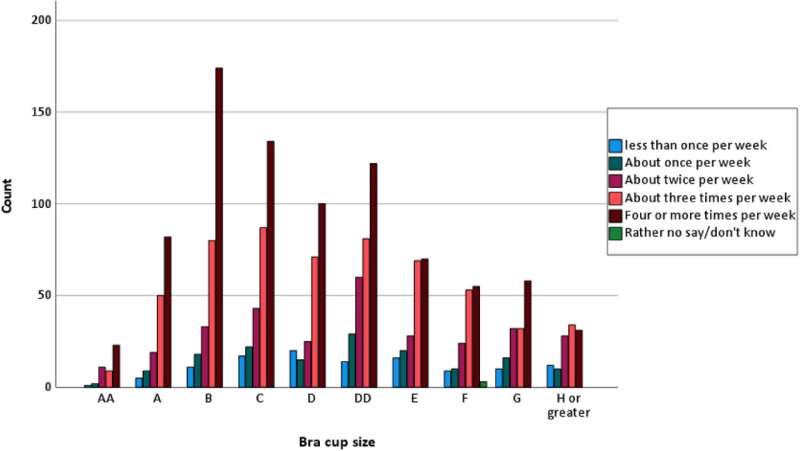This article has been reviewed according to Science X's editorial process and policies. Editors have highlighted the following attributes while ensuring the content's credibility:
fact-checked
trusted source
proofread
Examining how breast size affects women's attitudes to exercise

Women with larger breasts tend to exercise less frequently and avoid high-intensity exercise and a new study has found much improved participation in recreational group exercises after breast reduction surgery.
The new study published in JPRAS Open further strengthens calls for more accessible, publicly funded breast reduction and other interventions in some cases.
Based on research at Flinders University, the questionnaire was conducted with support from the free community Parkrun UK research board, an organization aiming to promote 5km running and walking events around the world—for all ages and fitness levels.
The survey was completed by almost 2,000 women involved in the Parkrun program in Australia, England and South Africa found women with bigger breasts believe that reducing their breast size would improve their exercise performance and participation
As well, all 56 women who had undergone breast reduction surgery in the group of 1987 surveyed women reported leading more healthy and active lifestyles.
"Women who had undergone breast reduction reported increased overall frequency, enjoyment and willingness to exercise in a group," says lead author Dr. Claire Baxter, a clinical registrar in reconstructive surgery at the Flinders Medical Centre.
"Our study found that breast size affects exercise habits and that breast reduction surgery changes their willingness to exercise."
Excluding women with a history of breast cancer, the study aimed to investigate how breast size impacts the exercise habits of women and how this compares to women who have undergone breast reduction surgery.
The South Australian study, including Flinders University Associate Professor Nicola Dean, promotes the importance of regular exercise for weight and ischemic heart disease and points out barriers for Australian Government subsidies for reduction mammoplasty as determined in the Australian Medicare Benefits Schedule.
"As well as the need for patients to have macromastia, experiencing pain in the neck of shoulder region, there are a number of state-based requirements for breast reduction to be performed," says Associate Professor Dean.
"For example, there are body mass index (BMI) restrictions in Queensland, Victoria and Tasmania which can lead to wait times of 12 months or more."
"In the UK, breast reduction surgery via the National Health Service varies across locations, resulting in a 'postcode lottery' as breast reduction is considered a lower priority procedure."
As well as comparisons between 5km parkrun competition times and bra size, the BREAST-Q study also looked at the cup size satisfaction levels—which showed more self-satisfaction with AA, A, B and C cup sizes than DD, E, F, G and H or greater.
In addition, life satisfaction and happiness was significantly related to bra size, with cup sizes greater than E reliably reporting lower mean results.
"The benefits of breast reduction surgery need more awareness and academic support," concludes Dr. Baxter.
More information: Claire R. Baxter et al, Self-reported breast size, exercise habits and BREAST-Q data—an international cross-sectional study of community runners, JPRAS Open (2023). DOI: 10.1016/j.jpra.2023.06.013





















